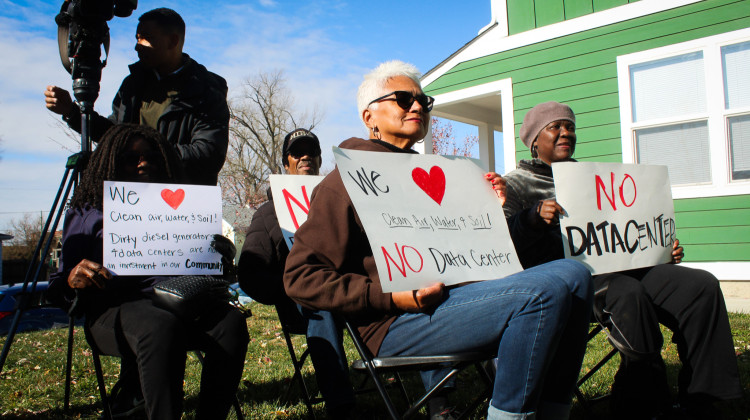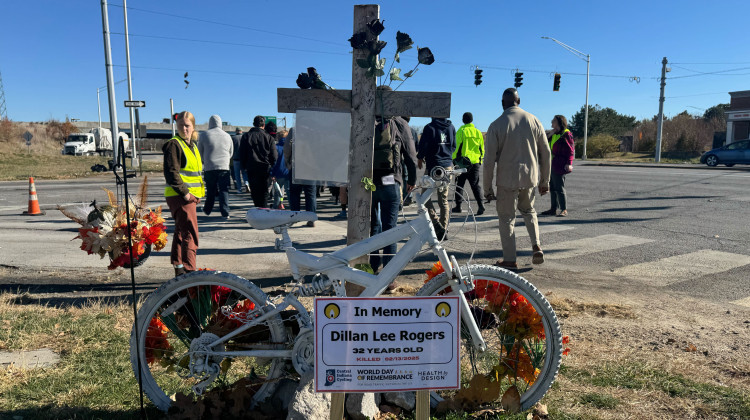
On March 16, Roberta Shelton became the first Hoosier to die from COVID-19. She and partner Tony Sizemore had lived together for the last six years.
Courtesy photoBOB ZALTSBERG
Tony Sizemore admits he was a pessimist who didn’t expect much good from other people.
Except for Birdie. He always saw the good in her.
But since Birdie died, he’s begun to see goodness in others. He thinks he understands why.
“It’s just a combination of people being scared, and Birdie being on the forefront of this and being the first one here to die,” he says. “I think it’s a combination of everything that has caused all the love and stuff, and the compassion.”
The forefront of a pandemic.
The first one to die.
On March 16, Roberta Shelton became the first Hoosier to die from COVID-19. She and Sizemore had lived together for the last six years, and to him and everyone who knew her she was Birdie.
Sizemore says he’s a private person, but he agreed to talk about Birdie’s life – and her death.
They had long been acquainted, ever since she and her friends would listen to him play music in rock, blues and country bands around Indianapolis. It wasn’t until decades later that they moved in together in the house where Sizemore grew up in an urban neighborhood on Sherman Drive.
Before they got together, Sizemore admired Birdie’s good works. But in the last six years he got a close-up look at how tireless she was in her efforts to make life better for others. She organized fund-raisers and other ways to help individuals in the neighborhood, women being released from prison, local bands and musicians. She advocated for abused and stray dogs and raised more than $10,000 for the families of Delphi teens and murder victims Abby Williams and Libby German. She helped countless others as a leader in the Beech Grove Moose Lodge.
While she exerted energy for others, her health wasn’t very good. Sizemore says she was diabetic and was hospitalized with respiratory issues three times during the six years they were together. He says he doesn’t generally pay close attention to the news, so when her first symptoms showed up, he wasn’t particularly concerned.
“When she got sick, I figured she would go and get some antibiotics for a couple of days, get some fluids, come home and be back to business as usual,” he says.
But at 69 years old with many underlying health conditions, she was magnet for the worst of the novel coronavirus.
She didn’t feel well enough to go with him while he played a gig on the night of March 6. When he got home at midnight the couple stayed up and watched a movie until about 3 a.m. Two hours later, she woke him. She was having trouble breathing, her head was pounding and she said he needed to take her to the hospital.
They drove to the Community East emergency room and she was admitted to the hospital.
Sizemore stayed with her through several days and into the nights. He would leave her to go home to feed their dogs, a 55-pound white pitbull named Bones and a 100-pound black Lab named Buddy. Birdie loved the dogs, their cat and all other animals.
She couldn’t stand to see animals without homes or mistreated, Sizemore says.
“If you would let her she’d have 15 dogs and a bear cub and five cats and a mountain lion,” he says. “She just loved animals.”
Antibiotics didn’t help and she kept getting sicker. When she tested positive for COVID-19, health care officials sent Sizemore home to quarantine for 14 days. He got telephone updates from the hospital, but Birdie was put on a ventilator and he never got to talk to her again. When her blood pressure plummeted and her kidneys started to fail, he knew the end was approaching.
“I was at home under quarantine and she passed, and it was just a horrible thing not to see her,” he says. “How do you get closure?”
He says the whole whirlwind doesn’t seem real to him: “It just happened so fast. I took her to the hospital and she’s gone in a week.” Now he’s alone in their home, with all of her clothes and a bunch of chores he doesn’t have the energy to do.
His quarantine period has ended and he hasn’t had any symptoms of the coronavirus. He knows he was exposed because he saw Birdie every day before and after she got sick, but he believes his general good health helped him through where Birdie’s diabetes and respiratory ailments were no match for COVID-19’s attack. He says his “mind’s still not right about it and I’m not sure it will be for a long time.”
He doesn’t know for sure where she was exposed and doesn’t blame anybody, but he suspects her job driving cars for a rental company may have contributed – people from all over renting cars and dropping them off. But it doesn’t matter how it happened, just that it did.
“Bless her heart, she was so selfless, gave to the community so much, to see her stricken down like that …” he says, voice trailing off.
He says Birdie’s been cremated and her ashes will be buried in a family cemetery in Greene County. A celebration of her life is being planned for Indianapolis this summer, and he says it will attract a big crowd.
“The thing up here, where Birdie’s done so much for the community, and she is so well known, it will be huge,” he says.
And out of the tragedy has come the kindness that Sizemore didn’t think possible before.
“The best thing of all this has been the love and the compassion and the generosity. People have just give and give and give. It’s been a tremendous outpouring of kindness,” he says.
All because of Birdie.
“She was a pretty incredible woman," Sizemore says. "She really was.”
 DONATE
DONATE








 Support WFYI. We can't do it without you.
Support WFYI. We can't do it without you.